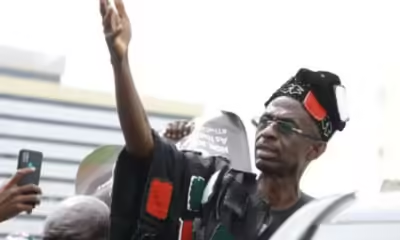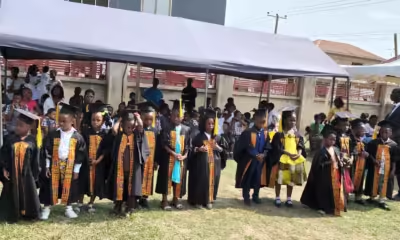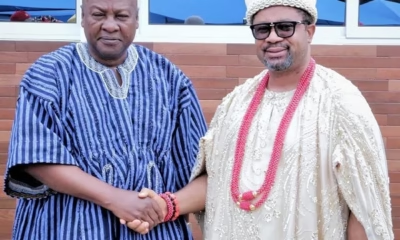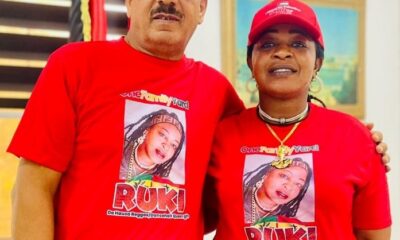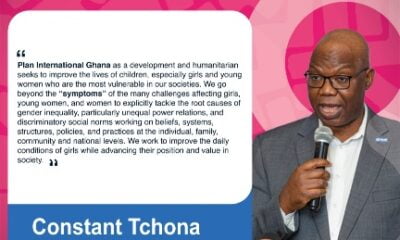Africa
Souleymane Cissé: Malian film-maker and Cannes Film Festival winner dies aged 84
Published
3 months agoon

Malian film director Souleymane Cissé, one of the pioneers of African cinema, has died aged 84.
His daughter, Mariam Cissé, confirmed his death at a clinic in the capital Bamako, expressing shock and mourning “the loss of a man who dedicated his life to film and art”.
The cause of his death has not been announced.
Cissé gained international recognition in 1987 when his film Yeelen (The Light) won the Jury Prize at the Cannes Film Festival, making him the first film-maker from sub-Saharan Africa to win an award at the prestigious festival.
His trailblazing career spanned more than 50 years, winning many accolades along the way.
In 2023, Cissé was honoured by Cannes with a Carrosse d’Or award, usually given to directors who have “marked the history of cinema with their boldness, their exacting standards and their intransigence in staging”.
Cissé was also a double winner of the grand prize at the Pan-African Film Festival, Fespaco, held annually in Burkina Faso.
At the time of his death he had been due to travel to Burkina Faso to preside over the jury at the festival, which opens on Saturday.
Tributes have been pouring in for Cissé for his dedication to African storytelling.
Mali’s Culture Minister Mamou Daffé lamented the loss “of this monument of African cinema”, while fellow Malian director Boubacar Sidibé said the country’s film industry was in “mourning”.
Film lovers have praised Cissé’s works for their complexity, political engagement and deep humanity.
His first feature film, Den Muso (The Young Girl) shot in 1975, was in the local Bambara language, and is considered an African classic.
The film is about a young girl who is raped, becomes pregnant and is rejected by her family.
The film was banned by the Malian authorities, and Cissé was jailed for having accepted French funding. He wrote the screenplay for his second film, Baara (Work), while in prison.
He made other films including Finyè (The Wind) in 1981, and Yeelen (The Light), which won the Jury Prize in Cannes in 1987. His last film in 1995 was Waati (Time).
Cissé was born in the Malian capital Bamako, and spent part of his childhood in neighbouring Senegal.
Later, he studied film in Russia’s capital Moscow, becoming one of the first generation of African film-makers.
Cissé went on to champion government support for and investment in the film industry.
He was the founding president of the union representing West Africa’s entrepreneurs in cinema and audiovisual arts.
Cissé was often outspoken about other barriers to the spread of African cinema – criticising “censorship” and “contempt”, and urging young film-makers not to act like “beggars who must plead every time for financing from Europe” but instead seek greater independence.
Hours before his death, he reportedly urged Mali’s military government to help the country’s industry catch up with its continental rivals.
“It is not enough to make cinema, the works must also be visible,” the AFP news agency quoted Cissé as saying.
“May the authorities help us with the construction of cinemas.” -BBC
You may like
Africa
South Africans exasperated by Trump false claims during Ramaphosa meeting
Published
1 week agoon
May 23, 2025
South Africans expressed dismay on Thursday at how U.S. President Donald Trump’s false claims of a white genocide dominated a conversation with President Cyril Ramaphosa, and many wondered if his trip to Washington was worth the trouble.
Ramaphosa included popular white South African golfers in his delegation and he had hoped talks with Trump in the White House on Wednesday would reset relations with the United States, which have nosedived since the U.S. leader took office in January.
But Trump spent most of the conversation confronting his visitor with false claims that South Africa’s white minority farmers are being systematically murdered and having their land seized.
“He didn’t get Zelenskyed. That’s what we have to hang onto (He) did not get personally insulted by the world’s most horrible duo of playground bullies,” Rebecca Davis of the national Daily Maverick wrote.
At a February White House meeting, Trump and Vice President JD Vance berated Ukrainian President Volodymyr Zelenskiy, calling him ungrateful for U.S. military aid, and Zelenskiy heatedly tried to argue his case.
For some, though, Ramaphosa’s cool composure raised the question of what was achieved by his having subjected himself to the onslaught.
“I don’t think it was the right call. I don’t think we need to explain ourselves to USA,” 40-year-old Sobelo Motha, a member of a trade union, said on the streets of Johannesburg.
“We … we know there’s no white genocide. So for me, it was pointless exercise.”
The South African president arrived prepared for an aggressive reception given actions in recent months by Trump, who has canceled aid to South Africa, offered refuge to white minority Afrikaners, expelled the country’s ambassador and criticised its genocide court case against Israel.
But throughout, Trump wanted only to discuss the treatment of white South Africans, playing a video and leafing through articles that he said proved his allegations.
—Reuters
Africa
Kenyan officer deployed to Haiti killed in violent gang encounter
Published
3 months agoon
February 25, 2025
A kenyan police officer deployed to Haiti to assist in combating violent gangs was killed during a confrontation with one of the gangs, according to Kenyan officials on Sunday.
The incident occurred in the Artibonite region, where Kenyan forces were engaged in operations to address gang violence.
The Kenyan mission reported that the officers were responding to a request for assistance from residents in Pont-Sonde.
The officer was airlifted for medical treatment but succumbed to his injuries, as stated by Godfrey Otunge, the commander of the Kenyan contingent in Haiti.
Following the shooting, the officers pursued the assailants. Mission representative Jack Ombaka expressed gratitude to hospital personnel and Salvadoran forces for their support after the incident.
“This is the sacrifice our brave officer made — he lost his life while defending the people of Haiti,” Ombaka remarked.
The Gran Grif gang is known to dominate the area.
This loss is a setback for efforts to control Haiti’s gangs, which have been rampant since the assassination of President Jovenel Moïse in 2021.
Kenya has deployed hundreds of officers to support Haiti’s struggling law enforcement, with an additional 200 officers arriving in February to join over 600 already present, as part of a multinational force that includes personnel from Jamaica, Guatemala, and El Salvador.
—Africa News
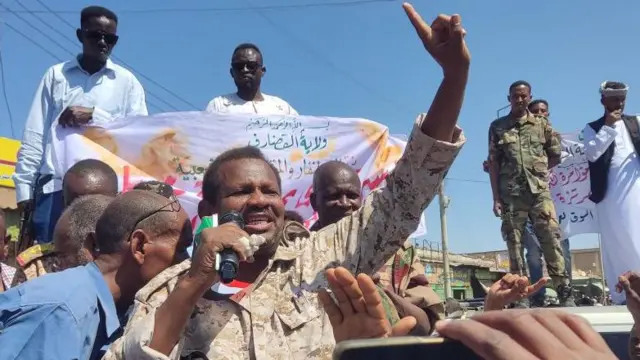
the Sudanese army says it has broken a near two-year siege imposed by the paramilitary Rapid Support Forces (RSF) on the key southern state capital of el-Obeid.
The breakthrough came hours after the RSF signed a political charter in the Kenyan capital, Nairobi, to establish a breakaway government in areas under its control.
The RSF and the army have been in a vicious battle for power since April 2023, with tens of thousands of people killed and millions forced from their homes.
The war has split the country, with the army controlling the north and the east while the RSF holds most of the Darfur region in the west and parts of the south.
El-Obeid, the capital of North Kordofan state, is a strategic hub connecting the capital, Khartoum, to Darfur. This is the latest army advance in recent weeks following the recapture of several parts of Khartoum from the RSF.
There was jubilation on the streets as Sudanese soldiers marched into the city.
A military spokesman, Nabil Abdallah, confirmed the gains in a statement, saying army forces had destroyed RSF units.
Finance Minister Jibril Ibrahim said the move was a “massive step” in lifting the RSF siege on el-Fasher, the capital of North Darfur province, and would also allow the delivery of humanitarian aid to Kordofan.
Sudanese civil society activist Dallia Abdlemoniem told the BBC Newsday programme that the recapture of the city “was “huge” and “significant”.
She said the RSF had “held the civilians captive for nearly two years” in the city.
The situation there was “horrific”, she said, adding that there had been no medical or food aid in an area considered “to be very risky in terms of famine and malnutrition”. —BBC.

60 beekeepers trained in Volta, Oti regions

Dagbon bows in majesty to bid farewell to Late Mion Lana

GTA official honoured for outstanding support to TOUGHA
Trending

 Politics9 months ago
Politics9 months agoVoter Register Discrepancies: NDC to stage nationwide protests against EC

 News10 months ago
News10 months agoArise Royals Montessori School Marks 2nd Graduation.

 News6 months ago
News6 months agoKing of Igbo Community in Ghana congratulates Mahama as President-elect of Ghana.

 Entertainment11 months ago
Entertainment11 months agoGhanaian musician Champions Gaza Peace with New Track

 More10 months ago
More10 months agoYoung people urged to develop their talents

 News11 months ago
News11 months agoCancer Support Network Foundation holds gala

 Entertainment11 months ago
Entertainment11 months agoSteps to receive an official GWR certificate – Details from mother of a Ghanaian record holder

 Women & Children10 months ago
Women & Children10 months agoPlan International Ghana Celebrates Milestone in Women’s Empowerment






